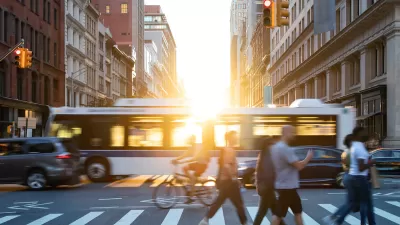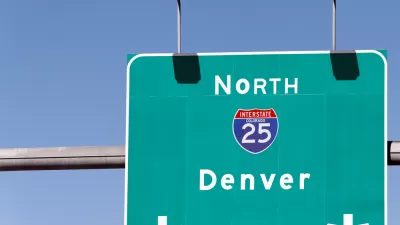If approved, the proposed regulations would require developers to implement policies to reduce single-occupancy vehicle trips for new developments.

A proposal before Denver's city council would "would require developers to implement specific programs to reduce the number of single-occupancy vehicle trips taken by tenants of new developments," writes Conor McCormick-Cavanagh in Westword. The plan calls for creating a set of transportation demand management goals that developers must consider when planning new construction. "For example, the proposal suggests, developers could offer subsidized transit passes for tenants or install showers, lockers and changing rooms for people who bike to work."
According to Alana Miller of the NRDC, who has been working on a transportation demand management proposal with the city's Department of Transportation and Infrastructure (DOTI), "there are benefits from a climate perspective, from air pollution, public health and affordability. It gets at quality of life and how Denverites have access to get around the city and go about their daily lives and do that in a more sustainable, accessible and affordable way." If approved, the rules would apply to all new commercial, residential, industrial, or office developments over a certain size.
The proposed rules intentionally give developers many options. "There’s tons of different transportation demand management strategies that can be implemented. And developers want to choose a strategy that makes sense for their building, their location and their tenants,' says Matt Kaufman of Urban Trans North America." But the plan's authors insist "this program does have teeth" and includes "compliance requirements and enforcement mechanisms." Other cities and counties such as San Francisco and Virginia's Fairfax County have adopted similar programs to reduce congestion and demand for single-occupancy car trips and improve opportunities for walking, biking, and public transit.
FULL STORY: Denver Wants New Developments to Help Reduce Cars on the Roads

Alabama: Trump Terminates Settlements for Black Communities Harmed By Raw Sewage
Trump deemed the landmark civil rights agreement “illegal DEI and environmental justice policy.”

Planetizen Federal Action Tracker
A weekly monitor of how Trump’s orders and actions are impacting planners and planning in America.

Why Should We Subsidize Public Transportation?
Many public transit agencies face financial stress due to rising costs, declining fare revenue, and declining subsidies. Transit advocates must provide a strong business case for increasing public transit funding.

Understanding Road Diets
An explainer from Momentum highlights the advantages of reducing vehicle lanes in favor of more bike, transit, and pedestrian infrastructure.

New California Law Regulates Warehouse Pollution
A new law tightens building and emissions regulations for large distribution warehouses to mitigate air pollution and traffic in surrounding communities.

Phoenix Announces Opening Date for Light Rail Extension
The South Central extension will connect South Phoenix to downtown and other major hubs starting on June 7.
Urban Design for Planners 1: Software Tools
This six-course series explores essential urban design concepts using open source software and equips planners with the tools they need to participate fully in the urban design process.
Planning for Universal Design
Learn the tools for implementing Universal Design in planning regulations.
Caltrans
Smith Gee Studio
Institute for Housing and Urban Development Studies (IHS)
City of Grandview
Harvard GSD Executive Education
Toledo-Lucas County Plan Commissions
Salt Lake City
NYU Wagner Graduate School of Public Service





























